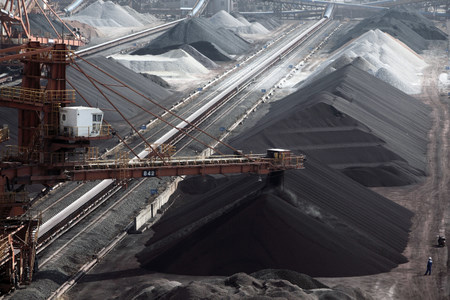Economy
Iron ore monopoly may end by 2015
By Gao Changxin (China Daily)
Updated: 2011-03-25 09:16
 |
Large Medium Small |
A conveyor belt dumps iron ore into a pile at a transfer and storage center operated by the Shanghai International Port Group in Shanghai. China is expected to increase its iron ore production to 1.5 billion tons by 2015, up from 1.1 billion tons in 2010, in a bid to reduce its reliance on imports. [Photo / Bloomberg]
Three companies account for about two-thirds of global supplies

SHANGHAI - The monopoly held on China's iron ore supply by a small number of international companies will be "thoroughly" broken up by 2015 as increased investment in the sector boosts global production, according to an expert in China's mining industry.
"The surging price of iron ore since 2003 has attracted a huge amount of investment in the sector, and there will soon be a concentrated release of capacity, breaking the monopoly a few big companies hold," Wu Rongqing, chief engineer of the industry development department at the China Mining Association, said on Wednesday.
"In fact, the global iron ore reserve is so rich that it can satisfy consumption for the next 100 years," Wu said in a speech at the China Iron Ore 2011 conference on Wednesday.
Vale SA, Rio Tinto PLC and BHP Billiton Ltd, the top three global suppliers of iron ore, have some high-quality ore, but they don't have all of the world's iron ore resources, he said. China will be less dependent on them, as it increases its own production and diversifies its import destination, said Wu.
Domestic demand for iron ore has increased sharply over the past few years, triggered by the nation's rapid economic development. But the country's iron ore supply has not kept pace, resulting in dependence on imports, mostly from the big three iron ore miners.
China, the world's largest iron ore importer and home to the world's largest steel industry, has complained that the big ore suppliers have been trying to force spot pricing on Chinese customers since Vale SA and Rio Tinto Group scrapped a decades-old annual pricing system in favor of a more flexible quarterly regime last year.
The three suppliers account for about two-thirds of the global supply of the resource.
In 2010, China's iron ore imports dipped 1.4 percent to 619 million tons, but the import price rose 61 percent to $145 a ton, as a result of the new pricing system.
| ||||
Rio Tinto, the world's second-largest supplier of iron ore, said in February that it registered $14.3 billion in net profit in 2010, up 50.5 percent from the $9.5 billion in the previous year. Its iron ore unit contributed more than $10 billion to the profit.
Wu said the international iron ore market will become "oversupplied" from the current classification of "tight-supplied" as early as 2013, as China and the rest of the world enlarge their production.
China will increase its iron ore production to 1.5 billion tons by 2015, up from 1.1 billion tons in 2010, in a bid to reduce its reliance on imports, Wu said.
The production of finished iron ore is projected to reach 760 million tons by 2015, when demand will be about 1.3 billion tons. That will reduce China's import dependency rate to about 42 percent from 63 percent in 2010, he said.
Meanwhile, overseas iron ore mining rights controlled by Chinese miners will increase to 200 million tons by 2015, from the current 90 million tons, as Chinese companies quicken the pace of overseas mine acquisitions.
China's fixed-asset investment in iron ore mining and selection rose 26.4 percent year-on-year in 2010 to reach 106.6 billion yuan. Planning and construction are underway to reach 480 million tons of mining and selection capacity annually, Wu said.
| 分享按鈕 |



